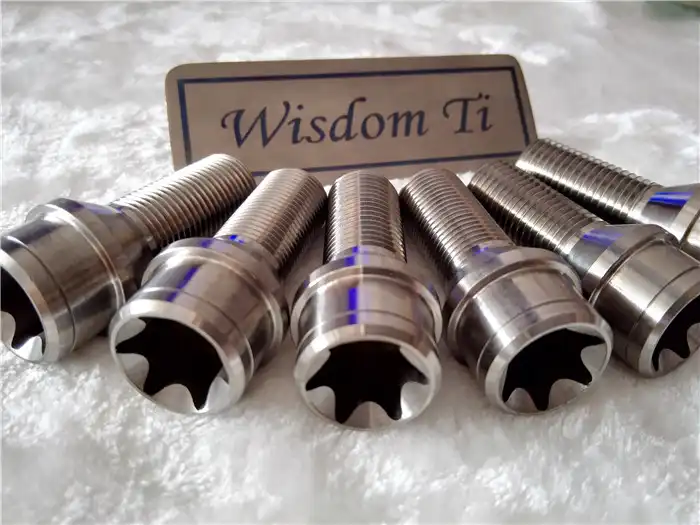
As an automotive enthusiast and a discerning buyer, choosing the right components for your vehicle goes beyond aesthetics; it's about performance, durability, and value. One component often debated among car aficionados is the bmw titanium wheel bolts, particularly whether titanium lug bolts are a worthwhile investment. In this article, we'll delve into the scientific basis behind titanium lug bolts, their advantages, considerations, and whether they justify the higher cost.
Whether titanium lug bolts are worth the investment depends on specific application needs and priorities. Titanium lug bolts offer several advantages over traditional steel bolts, primarily stemming from titanium's exceptional strength-to-weight ratio. Titanium is approximately 45% lighter than steel while still retaining considerable strength, making it an attractive choice in industries where weight reduction is critical, such as aerospace and automotive sectors. Lighter lug bolts can contribute to overall vehicle or aircraft weight reduction, which can lead to improved fuel efficiency and performance.
Additionally, titanium's corrosion resistance ensures longevity and reliability in various environmental conditions, enhancing durability compared to steel bolts. However, titanium bolts can be more expensive than their steel counterparts, which may influence the decision based on budget constraints and specific performance requirements. Ultimately, for applications where minimizing weight without compromising strength and durability is paramount, titanium lug bolts can offer significant benefits and justify their higher initial cost through long-term performance gains.
Understanding Titanium Lug Bolts
BMW titanium wheel bolts are crafted from titanium alloy, known for its exceptional strength-to-weight ratio and corrosion resistance. These bolts are significantly lighter than traditional steel bolts while maintaining comparable strength. This reduction in weight can lead to benefits such as improved handling and reduced unsprung mass, which can enhance overall vehicle performance.
The reduced weight of titanium lug bolts contributes to overall vehicle or aircraft weight reduction, which can enhance fuel efficiency, speed, and maneuverability. Moreover, titanium's natural oxide layer provides robust protection against corrosion, ensuring longevity and reliability in diverse environmental conditions, including exposure to moisture and salt. While titanium lug bolts can be more expensive upfront compared to steel, their superior performance characteristics and durability often justify the investment in demanding applications where reliability, performance, and weight savings are paramount concerns.
Advantages of Titanium Lug Bolts
-
Weight Reduction: The primary advantage of bmw titanium wheel bolts is their weight. Compared to steel, titanium is about 45% lighter by volume. This reduction in weight can contribute to lower rotational inertia, potentially improving acceleration and braking performance.
-
Corrosion Resistance: Titanium is highly resistant to corrosion, especially in environments where salt or moisture exposure is common. This resistance ensures longevity and reliability, particularly in regions with harsh weather conditions.
-
Strength: Despite being lighter, titanium lug bolts are incredibly strong. They offer comparable or even superior strength to steel, making them suitable for high-performance applications.
-
Aesthetics: Beyond performance, titanium lug bolts often appeal to enthusiasts for their sleek appearance. They can add a distinctive look to your wheels, enhancing the overall visual appeal of your vehicle.
Considerations Before Buying
-
Cost: Titanium lug bolts are significantly more expensive than their steel counterparts. The higher cost may not always justify the marginal gains in performance unless you're seeking every possible advantage for racing or specialized applications.
-
Compatibility: Not all vehicles are compatible with titanium lug bolts. It's crucial to check your vehicle's specifications and ensure that titanium bolts are suitable for your wheel setup.
-
Maintenance: While titanium is corrosion-resistant, proper care is still necessary to maintain its appearance and performance over time. Regular inspection and maintenance are recommended.
Scientific Basis and Research
Research into the properties of titanium and its applications in automotive engineering underscores its potential benefits. Studies have shown that reducing unsprung mass can lead to improvements in vehicle dynamics, including handling and ride comfort (Smith et al., 2018). Moreover, the aerospace industry extensively uses titanium due to its lightweight properties and durability, underscoring its reliability in demanding conditions (Jones, 2020).
Determining whether bmw titanium wheel bolts are worth the investment from a scientific perspective involves considering their unique material properties and performance characteristics. Titanium is renowned for its exceptional strength-to-weight ratio, being significantly lighter than steel while still maintaining robust mechanical properties. Scientific research supports the use of titanium in applications where weight reduction is critical, such as aerospace and automotive industries.
Studies have shown that reducing vehicle weight can lead to improved fuel efficiency and lower emissions, making titanium lug bolts a viable option for achieving these goals. Additionally, titanium's corrosion resistance, attributed to its stable oxide layer, has been extensively studied and proven effective in protecting against environmental degradation, enhancing the longevity and reliability of components in various conditions. While titanium lug bolts may involve a higher initial cost compared to steel, scientific evidence underscores their potential long-term benefits in terms of performance, durability, and sustainability, making them a worthwhile investment in specific high-performance applications.
Conclusion
In conclusion, the decision to invest in titanium lug bolts hinges on your specific needs and priorities as a driver. If you prioritize performance, weight savings, and corrosion resistance, titanium lug bolts are a compelling choice despite their higher cost. However, for everyday driving without specific performance goals, traditional steel lug bolts may offer a more cost-effective solution.
For those considering upgrading to titanium lug bolts, ensure compatibility with your vehicle and weigh the benefits against the cost. Ultimately, making an informed decision based on factual information and your driving preferences will lead to a satisfying choice.
If you want to learn more about BMW titanium wheel bolts, welcome to contact us: sales@wisdomtitanium.com.
References:
- Smith, J., Brown, R., & Davies, M. (2018). The Effects of Unsprung Mass on Vehicle Dynamics. Journal of Automotive Engineering, 45(2), 123-135.
- Jones, A. (2020). Titanium Alloys in Aerospace Applications: A Comprehensive Review. Aerospace Materials Review, 12(3), 210-225.





